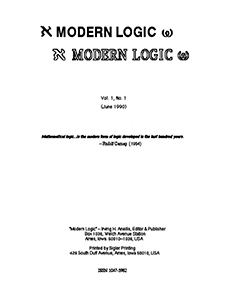Abstract
Kurepa trees have proved to be a very useful concept with ever growing applications in diverse mathematical areas. We give a brief survey of equivalent statements in algebra, particularly in valuated vector spaces, abelian $p$-groups and non-abelian periodic groups. The survey is prefaced by an outline of the illustrious history of Kurepa's Hypothesis. An interesting aspect of the work in this area is the equivalence (via Kurepa's Hypotheses) of some statements in abelian group theory with statements in non-abelian group theory. This kind of relationship would be hard to establish, without Kurepa trees. The goal of the paper is to alert as well as familiarize the readers with this active research amalgam of set theory and algebra, but also to entice at least some to take part in the work.
Citation
R. M. Dimitrić. "Algebraic equivalents of Kurepa's Hypotheses." Mod. Log. 8 (1-2) 28 - 46, January 1998 - April 2000.
Information




